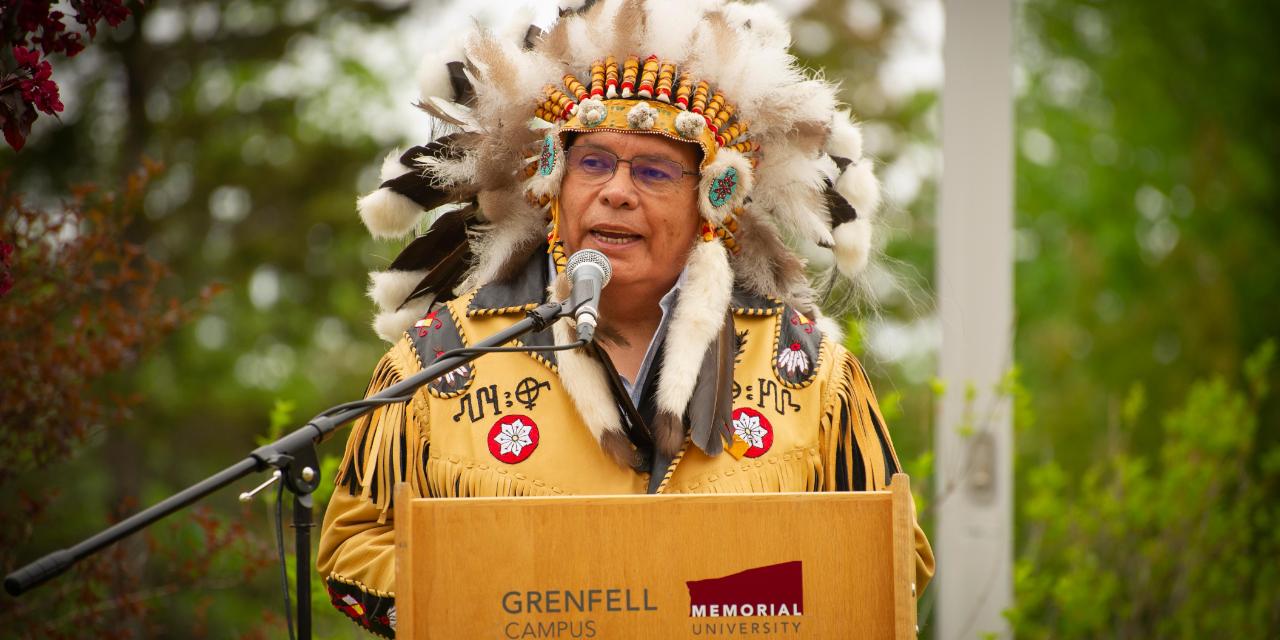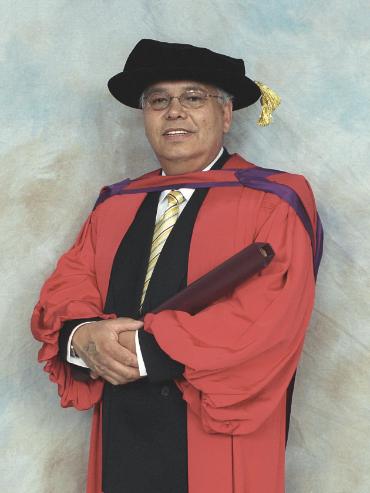Seven generations
When Dr. Saqamaw Mi’sel Joe returned to Conne River in 1973, after travelling and working across Canada, he came home to a community isolated and under-resourced — without plumbing, paved roads or jobs.
Over his 35-year tenure as administrative Chief and hereditary Saqamaw, he helped transform it into one of Atlantic Canada’s strongest Indigenous communities.
In 1982, following the passing of his uncle, he assumed the role of traditional Saqamaw. Just a few years later, in 1987, the community achieved federal status to become Miawpukek First Nation. And in 1988, Miawpukek introduced a dual-chief governance model with both a traditional Saqamaw and an elected administrative Chief.
Saqamaw Joe was then elected administrative Chief for 14 consecutive two-year terms.
His leadership was tested early. In 1983, the provincial government withheld $800,000 in federal transfer payments from his community. In response, Saqamaw Joe led a hunger strike in St. John’s that forced officials to release the funds.
Though it necessitated extreme measures, the moment marked a turning point for Miawpukek First Nation and the political history of Newfoundland and Labrador.
By 2023, Miawpukek generated an estimated $102 million in annual economic activity —remarkable progress considering its poverty-stricken status in 1991.

Saqamaw Mi’sel Joe speaks at Grenfell Campus. Photo by Lori Lee Pike from Grenfell Campus Archives.
Culture and ceremony grew alongside the economy. In 1985, Saqamaw Joe wrested control of the school in his community away from the Catholic Church.
In a moment that could be seen as an act of good will or as an act of abandonment, the church handed the school and the land over to the community. Either way, Miawpukek could now hire qualified teachers.
And following the achievement of federal status, Mi’kmaw language and culture became a part of the school curriculum.
The First Nation’s annual powwow, launched in 1997, soon became one of Newfoundland’s largest cultural gatherings, drawing hundreds each summer and celebrating identity through song, dance and community.
Saqamaw Joe was also instrumental in repatriating the remains of Beothuk ancestors Demasduit and Nonosabasut in 2020 — a moment of profound healing for Indigenous families and communities across Canada.
For his unending advocacy and activism, national recognition followed. He received Queen Elizabeth II’s Daimond Jubilee Medal in 2012. He was appointed a Member of the Order of Canada in 2018 and honoured for transforming Miawpukek into a model of Indigenous governance and prosperity.
In 2019, he was made an honorary lieutenant-colonel of the Canadian Rangers, and in 2024, he received the Frank McKenna Award for principled leadership.
He also received an honorary degree from Memorial University in 2004, and since that time Miawpukek and Memorial have slowly but surely developed a stronger and lasting relationship.
In 2014, he established an agreement with the Marine Institute (MI) with a framework for recruiting and enrolling members of Miawpukek First Nation in education and training programs.
And he’s formed a partnership with Memorial’s Faculty of Medicine that will support members of Miawpukek First Nation on their journeys to becoming doctors.
In 2019, he became the inaugural Visiting Elder for the School of Social Work’s Indigenous programming, sharing Mi’kmaw knowledge and teachings through storytelling and ceremony.
He’s currently a cultural advisor with Relationships First Newfoundland and Labrador (RFNL), an organization working toward restorative justice throughout the province.
RFNL is housed in Memorial University’s Faculty of Education. Saqamaw Joe’s leadership as a mentor and guide within the organization is transformative, teaching that to progressively seek restorative justice, we must first learn and understand the stories of injustice.
He’s also promoting the university within his community, encouraging young people to seek higher education and finding ways to support them through graduation and beyond.
Through his collaboration with scholarly projects, oral history research and educational outreach, Saqamaw Joe is helping to shape how Memorial incorporates Indigenous epistemologies and perspectives in programs and student life.
By the time he retired from his position as administrative Chief in January 2024, Miawpukek stood as proof of his unwavering commitment and willingness to stand up for his community.
And through his advocacy and teachings, he continues to build a better world for seven generations to come.
